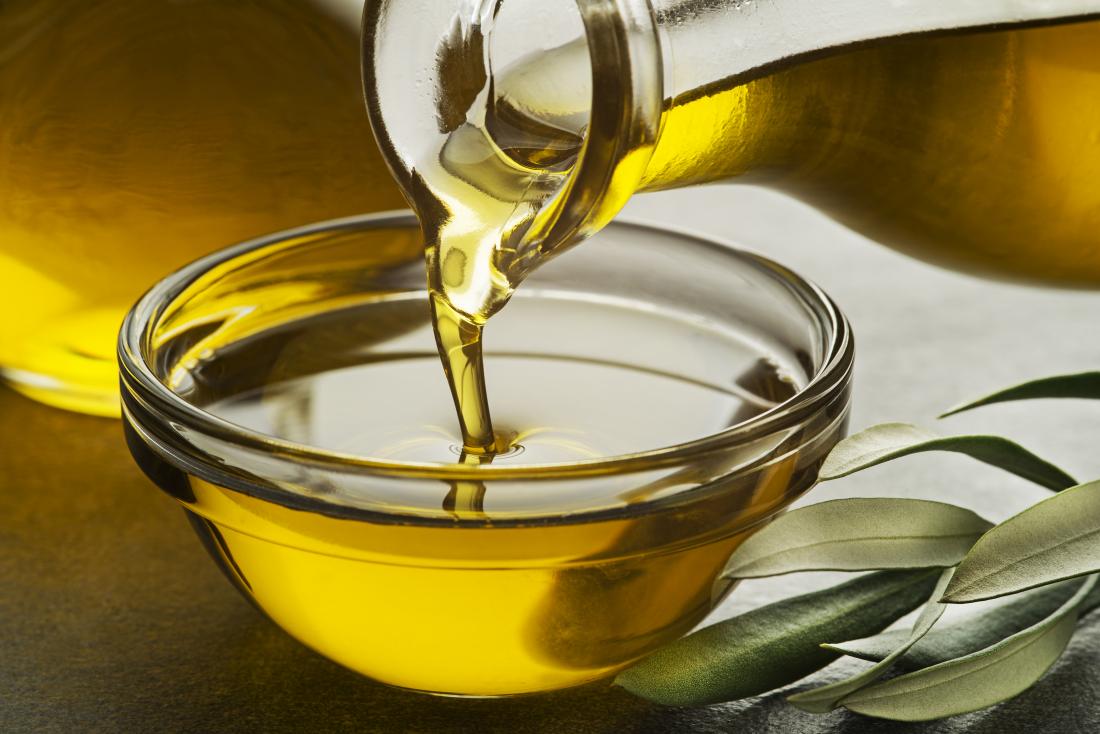
What are the most healthful oils?
Healthful oils are an important part of every diet. There are many types of oil to choose from, so which are the best ones for cooking, nutrition, and health benefits?
Dietary fats play an essential role in the body. The fats in food help the body to absorb vitamins A, D, E, and K. They are also essential for brain and nerve function.
The 2015–2020 Dietary Guidelines for Americans recommends adding healthful oils to the diet to help support a healthy body weight and reduce the risk of heart disease.
There are many different oils to choose from, such as olive, coconut, canola, and vegetable oils. Each of these oils has different characteristics.
In this article, we look at the properties of olive oil, coconut oil, canola oil, and vegetable oil for nutrition and cooking, plus any adverse effects, and their overall health benefits.
Nutritional values

The following table from the United States Department of Agriculture compares the nutritional value of 1 tablespoon (tbsp) or 15 milliliters (ml) of olive oil vs. coconut oil vs. canola oil vs. vegetable oil in grams (g).
Oils do not contain protein or carbohydrates and are not a significant source of vitamins and minerals. None of these oils contain trans fat, a type that is harmful to human health.
Oils are very high in calories and a good source of energy.
Olive, coconut, canola, and vegetable oils each provide the same number of calories per tablespoon.
| Extra virgin olive oil, 1 tbsp | Organic virgin coconut oil, 1 tbsp | 100% pure canola oil, 1 tbsp | 100% pure vegetable oil, 1 tbsp | |
| Calories | 120 | 120 | 120 | 120 |
| Total fat | 14 g | 14 g | 14 g | 14 g |
| Saturated fatty acids | 2 g | 13 g | 1 g | 2 g |
| Monounsaturated fatty acids | 10 g | 1 g | 8 g | 3 g |
| Polyunsaturated fatty acids | 1.5 g | 0 g | 4 g | 8 g |
The most significant difference between each of these four oils is their fat profile:
- Extra virgin olive oil is highest in monounsaturated fats.
- Organic virgin coconut oil contains the highest levels of saturated fats.
- Pure vegetable oil has the most polyunsaturated fatty acids per tablespoon.
An American Heart Association (AHA) report states that unsaturated fats, which include monosaturated and polyunsaturated fats, can reduce the risk of heart disease when people chose to eat them instead of saturated and trans fats.
Research has associated saturated fats with higher levels of low-density lipoprotein (LDL) cholesterol in the blood. LDL cholesterol, which doctors also call bad cholesterol, is a significant risk factor for cardiovascular disease.
There is some debate among researchers about whether or not people can consider coconut oil a healthful addition to the diet.
Coconut oil

Many people believe that coconut oil is a healthful fat that benefits heart health. These health claims have stimulated debate in the scientific community because of the very high levels of saturated fatty acids that coconut oil contains.
Some commercial websites say that coconut oil behaves differently than other oils that contain high levels of saturated fats. They claim that coconut oil has similar properties as medium-chain triglycerides.
These medium-chain fatty acids are healthful because the body digests and absorbs them more quickly than long-chain fatty acids. This makes them a better energy source than long-chain triglycerides.
However, coconut oil contains mostly lauric acid, which acts like a long-chain triglyceride and does not have the same healthful benefits as medium-chain triglycerides.
Evidence suggests that replacing coconut oil with oils that contain a higher level of unsaturated fats may reduce risk factors for cardiovascular disease.
In two studies on the effects of coconut oil vs. vegetable oil, researchers observed that coconut oil increased the levels of LDL cholesterol in comparison with safflower oil and olive oil.
Another 2018 study suggests that coconut oil raises HDL cholesterol, which doctors call good cholesterol, compared with butter and olive oil.
However, in light of the overall research to date, the AHA advise against people consuming saturated fats, such as coconut oil. Further research is needed to know the true effects of coconut oil on health.
Olive oil
Olive oil has a more favorable fatty acid profile. Olive oil has a very high level of monounsaturated fats.
Olive oil mainly contains oleic acid, with smaller amounts of linoleic acid and palmitic acid.
In a clinical trial known as PREDIMED, researchers observed lower rates of cardiovascular problems, which include heart attack, stroke, and death from heart disease, in people following the Mediterranean diet with either extra virgin olive oil or nuts, as opposed to a control diet.
As long as olive oil is not heated, the antioxidant properties in the oil are higher than those of vitamin E. The antioxidant effects may provide protection from oxidative stress in a person’s body. Reducing this type of biological stress can slow down or prevent tumor cells from growing or developing.
Cooking with olive oil
Olive oil remains stable even when people heat it to high temperatures because of these antioxidants.
Also, when heated to a high temperature for a long time, extra virgin olive oil releases a lower amount of unhealthful compounds compared with canola and vegetable oils. This is because the high levels of monounsaturated fats are more stable in high heat.
Canola oil
Canola oil also has low levels of saturated fatty acids and high levels of unsaturated fats.
A group of researchers from the Department of Food Science and Human Nutritional Sciences in Manitoba, Canada, reviewed the evidence for the health benefits of canola oil.
Their results demonstrate that people who follow diets they based on canola oil had lower total cholesterol levels compared with those consuming a typical Western diet high in saturated fatty acids.
The researchers suggest that the canola oil could reduce LDL cholesterol levels by an average of 17 percent when they compared it with that of the typical Western diet.
Cooking with canola oil
When people expose canola oil to high heat for long periods, a chemical reaction occurs that releases potentially unhealthful compounds.
To safely use canola oil, people can use it to quickly sauté vegetables, meat, or meat alternatives, making sure that the oil does not get too hot.
Vegetable oil

Manufacturers make vegetable oil from oilseeds, legumes, nuts, or the flesh of some fruits.
Vegetable oil contains the highest levels of polyunsaturated fats compared with olive, coconut, and canola oil.
Partially hydrogenated vegetable oils contain trans fats. Trans fats are unsaturated fatty acids with a different chemical structure. Clinical trials consistently report on the adverse effects of trans fats on risk factors for cardiovascular disease.
Trans fats are in a variety of processed foods such as margarine, baked goods, and deep-fried foods. Because of the dangers health experts associate with eating trans fats, manufacturers must include the trans fats content on food labels.
Vegetable oil in cooking
Similarly to canola oil, vegetable oils are not stable when people use them at high temperatures.
Vegetable oils have low levels of antioxidants and can release potentially harmful compounds when heated. Researchers have linked these compounds with various forms of cancer, Alzheimer’s disease, and Parkinson’s disease.
Using oils in cooking
Since the properties of each oil are different, each oil has its unique uses in cooking.
People can use olive, coconut, canola, and vegetable oil when sautéing. Coconut oil works well in baked goods. People can use vegetable oil for frying and making mayonnaise, salad dressings, and sauces.
Extra virgin olive oil has the most versatile flavor compared with other oils. It can be grassy, peppery, or fruity, depending on the olives. People can use extra virgin olive oil in vinaigrettes and as a finishing drizzle over a final dish.
Other uses of oil
Olive oil has a long history of use in hair and skin products. The anti-inflammatory effects of olive oil may help in wound healing.
The high levels of linoleic acid in vegetable oil make it a suitable ingredient in skin products. Linoleic acid can improve skin hydration and reinforce the skin barrier.
Researchers have observed that coconut oil may help control symptoms of skin rashes in children. Coconut oil may also help speed up wound healing and help the skin repair itself.
Summary
A healthful, high-quality diet requires dietary fats. Oils provide beneficial fatty acids. The different oils we discuss in this article have different fatty acid profiles.
Choosing oils with a higher level of unsaturated fatty acids may provide the best health benefits. People should be aware of the different cooking methods that may change the healthful properties of oils.
People also use different oils on their skin because this helps to hydrate and repair the skin barrier.
Source: www.medicalnewstoday.com


